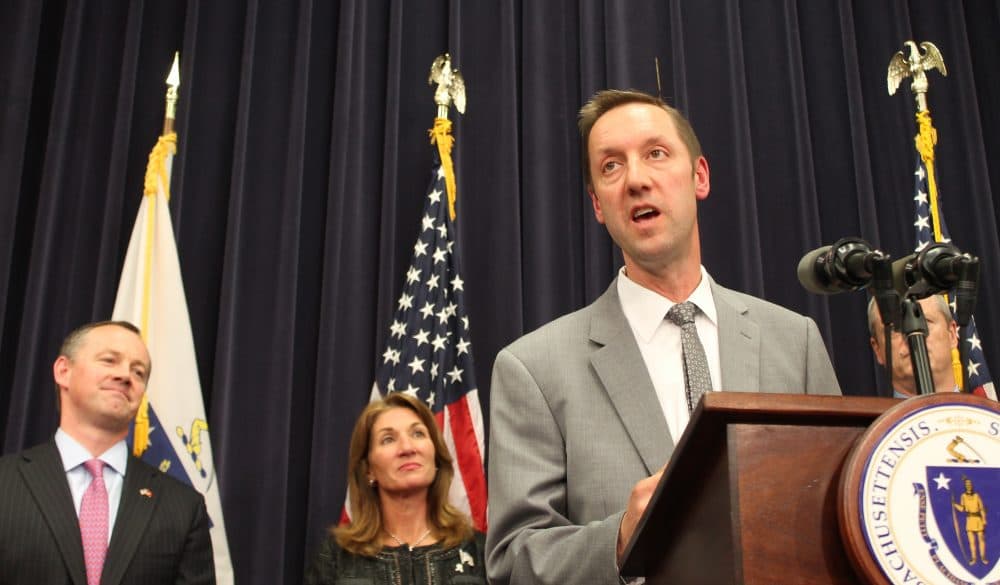Advertisement
Departure Triggers Overhaul Of MBTA Management

The MBTA leadership team is undergoing a sudden overhaul with Acting General Manager Brian Shortsleeve departing at the end of June, triggering a series of moves pending the hiring of a permanent CEO.
Shortsleeve's exit before the expected completion later this year of a search for a permanent general manager prompted Gov. Charlie Baker to announce Thursday that Steve Poftak, the vice chair of the T's Fiscal and Management Control Board, would become the interim GM, and Shortsleeve would fill Poftak's position on the board.
Poftak will himself return to the board after the hiring of a permanent general manager, taking the spot of Lisa Calise who had planned to step down to focus on her new job as vice president for administration and finance at UMass, but has agreed to stay on until the CEO search concludes.
Chief Operating Officer Jeff Gonneville will be promoted to deputy general manager, and Chief Financial Officer Mike Abramo will become chief administrative officer focused on the T's finances.
The MBTA has been going through a period of transition and reinvention following the disastrous winter of 2015 that fully exposed the system's financial and structural deficiencies.
Baker credited Shortsleeve and the board for putting in place a $3.7 billion capital plan, controlling the growth of operating expenses, getting new buses on the road, "doubling down" on the purchase of new Red, Orange and Green Line cars that will improve capacity, and investing over $100 million to make the system more resilient in poor weather conditions.
"The MBTA is still in turnaround mode and needs a turnaround CEO, not a traditional manager," Baker said of the ongoing CEO search.
The governor also announced that he had formally granted the FMCB's request to extend its charter by two years through 2020.
Shortsleeve's departure will force another shakeup of leadership at the agency that has seen considerable turnover at the top over the past several years.
No reason was given for the urgency behind Shortsleeve's decision to depart on July 1 instead of waiting until a full-time general manager could be hired. "Brian promised us two years when he came on board and he has fulfilled his promise," Transportation Secretary Stephanie Pollack said.
Advertisement
Shortsleeve said he would be willing to discuss his plans after he leaves the MBTA, insisting that his focus over the next month will be to ensure a smooth transition to Poftak and providing service to the one million passengers expected to ride the T in June when the Tall Ships sail into Boston Harbor.
"I spent my career in the business world, investing in companies, working with companies, helping them grow, helping them through tough times when they're struggling, and I'm happy to talk about that in July," Shortsleeve said.
Asked if he was considering a run for political office, Shortsleeve said, "I'll be back in the business world."
Lt. Gov. Karyn Polito credited Shortsleeve and his team at the MBTA, along with Secretary Pollack, for putting the T on more stable footing.
"We are extremely appreciative that the organization is in a better condition today than when it was when we came into office, and that is truly a legacy gift you have given to all of us and we appreciate it," Polito said.
Poftak, the executive director of the Rappaport Institute for Greater Boston at the Harvard Kennedy School, said he looked forward to the challenge of running the agency after immersing himself in the issues over two years on the FMCB.
"We've made great progress. We have a lot of hard work ahead of us, but being on the control board means you're an optimist. I believe the MBTA's best days are still to come and we look forward to delivering on the promise of this great system," Poftak said.
Pollack said she has no timeline for the completion of the general manager search, but a spokesman for the MBTA said the search firm Lochlin Partners has presented a list of candidates and that the interviewing process has begun.
"We're going to take as long as we need," she said.
Baker said that between five and 15 candidates are currently under consideration, and that neither Poftak nor Gonneville, Pollack or Abramo were candidates for the permanent job.
Shortsleeve earns an annual salary of $175,000 as chief administrator and interim general manager, and Pollack said that Poftak would likely be paid at a higher rate. Though negotiations with Poftak are still underway, Pollack said the administration wanted to send a signal to the market that the MBTA is willing offer a competitive compensation package to attract and retain top talent.
She said the going rate for a general manager of a transit system the size of the MBTA would likely be in the "high two hundreds to low three hundreds." The MBTA is also looking for a commitment of three to five years from its next general manager.
"There's no question that long-term stable leadership is a part of the equation," Pollack said.
One of the more immediate issues facing the new leadership team at the T will be concluding negotiations with the machinists union over a new contract, according to officials. Baker also identified the MBTA pension fund as a major concern.
"I think there's a larger conversation that needs to be had with respect to the pension problem," Baker said, adding, "There's not enough money in that system to fund the retirements currently in the system, much less than those planning to retire."
Baker put fault for the financial instability of the fund on the way it was operated "completely off the books and totally opaque" prior to his signing of a public records reform law that opened the system to public scrutiny.
This article was originally published on May 25, 2017.